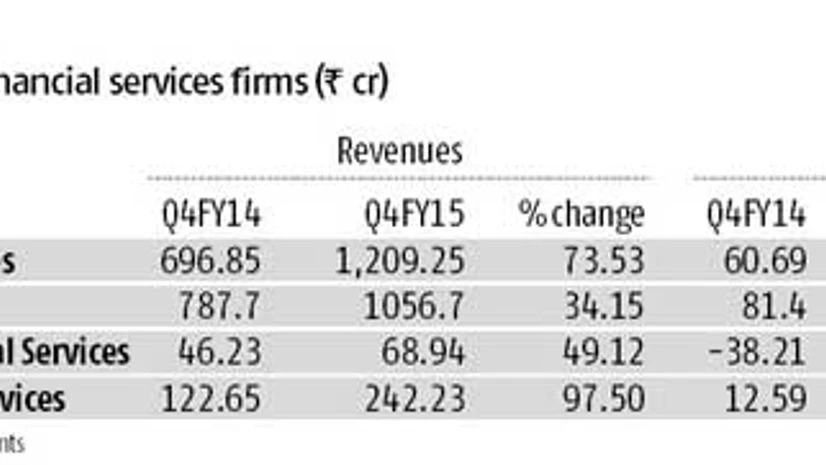Income from operations of financial services firms with brokerage arms have seen a significant rise, on the back of the improvement in retail broking activity, in the quarter ending March.
IIFL, Motilal Oswal, Geojit BNP Paribas and Edelweiss all had growth in their broking revenues as volumes in the equity markets picked up. IIFL Holdings saw its revenues from capital market activities increase by 74 per cent to Rs 129.7 crore from a year before. Motilal Oswal saw its revenues from broking jump 84 per cent to Rs 142 crore in the period. Edelweiss saw its agency business, which includes broking, grow 133 per cent to Rs 254 crore.
“On the broking side, we are seeing a significant increase in flows into mutual funds and insurance companies, also our clients. Lots of Indian household savings are coming back into equities,” said Rashesh Shah, chairman and chief executive, Edelweiss.
For most of these entities, broking activities are no longer the mainstay of their business. They have diversified into lending, private wealth management and asset management. Broking, for some, forms less than a quarter of total business. Geojit is the exception, still having a substantial amount from here.
Sector officials said the March quarter had been among the best in a couple of years, the activity ratio (active investors to the total) improving with the return of retail investors.
The markets began an uptrend in April 2014, on hope of a new government at the Centre. Equities rose 30 per cent in the year but started tapering in the early part of 2015. The markets are still up 24 per cent since April last year. Broking revenues in the first three quarters of 2014-15 were led by rising participation of high net worth individuals (HNIs), sectoral officials said.
“Retail participation has only come in the last quarter of FY15. Until then, it was only HNIs who were aggressively investing. Now that retail has come in, we believe it will continue,” said Prasanth Prabhakaran, president, retail broking at IIFL. Its average daily equities turnover was Rs 7,938 crore, up 54 per cent from the corresponding quarter last year.

However, brokerage rates will take some time to head north. “Only after retail investors come in will there be an increase. Now that we are seeing a return in participation, these rates will accordingly go up. The good news is also that blended broking yields have stopped declining and started plateauing,” said Prabhakaran.
Blended broking yields refer to the total brokerage earned by both the cash and derivatives segment. These had fallen had been on a down-trend for the past few years as volumes in the cash market fell, followed by a shift in trading patterns to the options segment.

)
